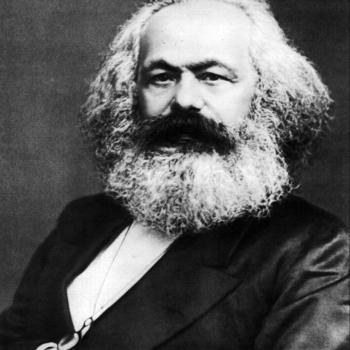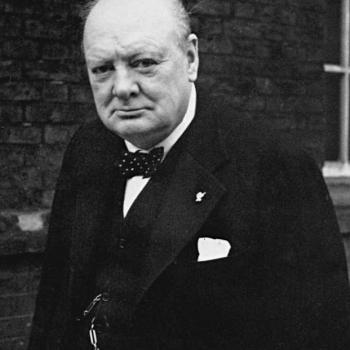As I was saying: The Salt Lake Tribune has presented me as a critic of “secularism.” Fair enough – I am happy to criticize something we can call secularism. Adam Miller finds my program, as stated in Tribune, too simple. Hancock poses a false choice, Miller says, between a faithful and a “secular” view. Sure, he concedes, the academy’s view is secular, but that’s OK, because we can learn from secularism. Anyway, the issues are not simple (as the Tribune’s Hancock would have it), but “messy.” Most of all, we must see that faith and secularism can learn from one another. But Hancock doesn’t want to learn; he only wants to guarantee the vindication of “what we already think.”
This is indeed a very deft way of dealing with the Hancock problem: There are problems with secularism, and also advantages. Hancock is charmingly simple, but reality is complicated. Hancock thinks he knows the answers already, but we must be open to “mutual transformation.”
So let’s have a closer look at the problem. Just how simple is Hancock? And just how “messy” or complicated is reality?
First, re. my charming simplicity. What is simplistic, I suggest, is to take the Tribune’s narrative framing of me (Hancock vs. “Secularism”) as an adequate statement of my views. Ms. Stack had the courtesy to cite and I think link my own actual statements of my position in First Things and at Meridian Expand. Miller, Wickman and others might do the courtesy of considering these statements before they exult in my simplicity. Here, for example, is an excerpt from my introduction to Meridian/Expand:
All faithful engagements with intellectual and cultural trends and forces will be welcome, and that means entertaining both comparison and contrast between the church and the world. We will seek both to identify points of opposition between the gospel and leading intellectual trends and to discover intellectual and cultural resources that open up new possibilities in fully appreciating and articulating gospel truths, wherever these may be found.
Does this sound like the point of view of someone whose interest is focused narrowly on vindicating what I already think I know? Of course, if anti-anti-secularists were really interested in getting a sense of what my alternative to “secularism” might look like, they could consider consulting whole books I have written on the subject, books addressed to philosophers and scholars that attempt to dig beneath the problem of “secularism” to the deeper question of the very meaning of “reason” considered as a an alternative to revelation and to the morality of a political community. From Calvin and the Foundations of Modern Politics to The Responsibility of Reason, I have been concerned, not to say obsessed, with the complications inherent in the notion of “secularism.”
Of course it would be unreasonable (if you’ll pardon the expression) to expect my critics to master my scholarly works before responding to a newspaper article about my anti-secularism. But I might ask them not to assume at the outset that I am unaware of the marvelous complexities and messiness they relish.
Turning now to Matthew Wickman, Director of the BYU Humanities Center. I think Prof. Wickman represents a fairly common response to my concerns from colleagues learned in the humanities and human sciences. Again, this response seems to be consonant with Adam Miller’s: Hancock is simple, but secularism is complicated. Here is Wickman’s concluding paragraph:
Ultimately, I think Wood is right: secularity is a profoundly, and historically, uncertain category. And, from the perspective of the humanities, and BYU, the more uncertainty the better, for that makes everything seem all the more complex, open, and infinitely possible. But that leaves us in a tenuous place with which neither Hancock nor Wood may be entirely comfortable, a place of paradox we can perhaps best articulate by paraphrasing the aphorism (mistakenly attributed to Abraham Lincoln) about the common man: God must love the secular, he made so much of it.
This seems to amount to: we have no idea what secularism is. But we are sure of one thing: Hancock is wrong to worry about it. In a word: “What, me worry?” (for those old enough to remember the motto of the great Alfred E. Neuman).
Earlier in his statement, though, Wickman cites Charles Taylor (or a secondary source on Charles Taylor) as a warrant for a particular understanding of the secular that reassures us in our determination not to find it worrisome:
Indeed, Wood adds, it is the ambiguity between those positions that incites – and, historically, fails to secure – “a settled method in public and institutional life by which multiple perspectives (including multiple understandings of secularity) can both cohabit and be equally heard.” By this estimation, what secularity seeks is not global domination but rather a seat at the table.
OK then. This indeed amounts to an argument that we should not worry about secularism. But I cannot help but notice that the argument requires a certain, pretty definite – and pretty contestable – definition of secularism: i.e., secularists are nice, they just want a thousand flowers to bloom and just to be allowed a seat at the table watching them bloom (and not to be excluded by those who seek “global domination” – which would be the non-secularists, I suppose. Like me, I suppose).
So here seems to be the state of the anti-simplistic argument: Secularism is complicated, messy, we have no idea what it means – ergo, we mustn’t worry about it. Or: Secularists are nice and only want certain others who are asserting their global domination (those Mormons, maybe?) to give them a seat at the table – ergo, we mustn’t worry about it. One thing is sure, in any case, one thing is not messy or complicated: we mustn’t worry. And certainly we must not worry in such a way as to trouble the peace of our academic colleagues or give the impression that they could be wrong in any significant respect, because, after all, the academic enterprise is about civility and collegiality and so about never, ever impolitely proposing that any of its basic assumptions might be less than well-examined.
So here we have arrived at the point where I must confess guilt re. the charge of simplicity. There is much that is messy and complicated about the origins of meaning of secularism. It is fun to sort through this complicated messiness; I do it all the time.. But one thing is not so complicated: secular liberalism today is not about holding off the world domination of religious orthodoxy just enough to secure a place at the table to watch all the flowers blooming. Secularism is a worldview that is dominant in the academy and increasingly among legal and mediate elites, and many others too. (Consider on this point the legal and constitutional analysis of Steven D. Smith, cited in my previous post here.)This view of the power of secularism in today’s world may be too simple for your taste, but that is not the question. The question is: is it true? I would invite Adam Miller and Matthew Wickman to consider this question.
If we were to consider this question as applies to Charles Taylor’s marvelously subtle and non-confrontational interpretation of secularism, we might find that even he cannot completely avoid the question of the actual (simple) moral-political implications of contemporary secularism. [to be continued…]












